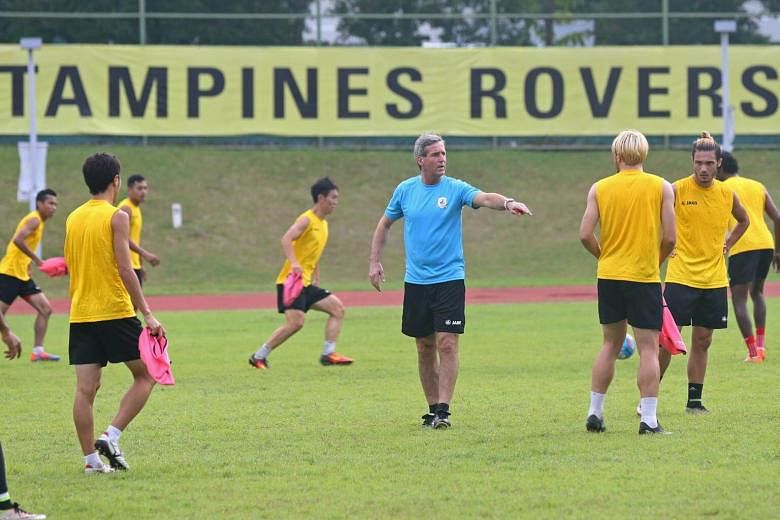For more than a decade, Tampines Rovers have been seen as one of the S-League's leading clubs with their on-field success. But as the league, and Singapore football, seeks to reinvent itself ahead of the 23rd season next year, the Stags are also charting new waters off the pitch.
According to Tampines chairman Desmond Ong, about half of his 24-man squad for next year will be on three-year contracts and a quarter are on two-year deals.
Balestier Khalsa and Hougang United have also offered long-term contracts, signalling a shift towards greater financial security for local professional footballers.
It is a far cry from previous years when 10-or 11-month deals were the norm. That has changed through a combination of the Football Association of Singapore (FAS) securing funding for the S-League for the next five years, and the newly introduced age quota which has spurred clubs to lock down players for longer periods.
The six local clubs will receive just under $900,000 in subsidies - about 20 per cent less than for 2017 - of which the bulk will go towards salaries. S-League clubs have squads of between 19 and 25 players.
This has allowed sides like Tampines to focus on stability, said Ong, the managing partner of legal firm JLC Advisors.
"The club are now able to do medium-to long-term planning. And I think the players appreciate that too."
At Tampines, there are three different models for multi-year deals.
The first sees built-in increments year on year of between eight and 10 per cent. The second, mainly for younger players, includes a year-end review during which the club and player can agree on an appropriate adjustment. The third, for veteran players, is pegged to a fixed salary for the entire contract.
It is understood that most of the players that opted to remain with Tampines on multi-year deals accepted pay cuts.
This made sense especially for those players in their prime unlike those approaching retirement, said Warriors FC midfielder Syaqir Sulaiman, who is in contract negotiations with his club.
The 31-year-old added: "Some older players start coaching at private academies, and these academies sometimes insist you have to come on board as full-time coaches.
"A three-year contract gives players stability and a sense of security, and shows that the club value me and want me."
In the S-League, Singapore internationals earn between $5,000 and $10,000 monthly - comparable to foreign imports - while local Under-23 players starting out their careers earn between $500 and $2,500.
Hougang have offered two-year contracts to five players from their 22-man squad. Their general manager Matthew Tay believes short-term contracts "will become a thing of the past as the S-League matures. Clubs are more open and thinking and planning further. But we need players to also produce and not take things for granted."
That has always been the worry for Balestier chairman and FAS vice-president S Thavaneson. In the past, he favoured 11-month deals but has tied 12 of his 17 players down to two-year contracts.
He said: "Previously, some players were very unprofessional. They sign 12-month contracts, but then in December, after the season is over and they do not want to continue with the same club, they start training with a new club.
"But on whose salary? This was what upset many clubs."
Long-term contracts could also breed apathy, noted Geylang International coach and former Lions winger Noor Ali.
His club offered two-year contracts to more than half their squad at the beginning of 2016, but of that group, only winger Shawal Anuar was offered a renewal for 2018.
The Eagles will revert to 11-month deals for next season.
Noor said:"We realised those on one-year contracts performed better and were hungrier."
Warriors general manager Paul Poh agreed, saying: "We learned from years of experience that offering players contracts year-after-year is better.
"We use performance data from Instat (a statistical analysis tool) to assess overall match performance - including number of injuries, yellow and red cards - as well as performance in training.
"To me, although our contracts are year on year, essentially they are unlimited. As long as players are able to perform, their contract will continue."
Trust in his players' professionalism was his guiding principle, said Ong. "I run a law firm. I don't sign my lawyers on 11-month contracts because I fear they will become complacent.
"Our footballers have spent their lives honing their skills and working hard to get to where they are.
"So I think it is an insult, and that we are doing them a disservice, if we think this (complacency) will happen."

